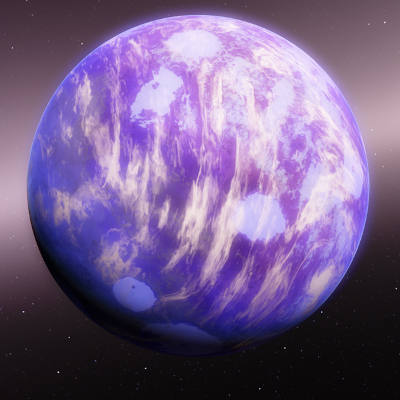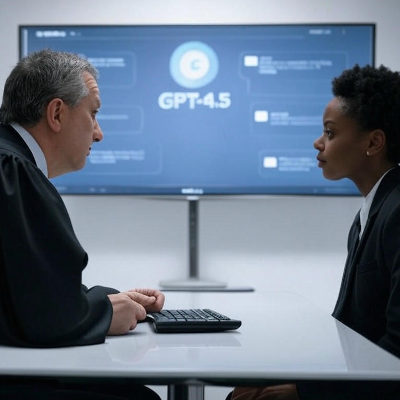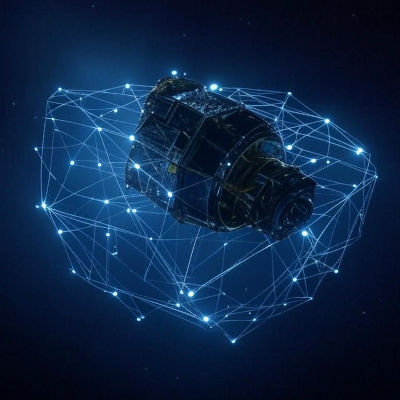Should we still want biological space colonists?
Feb. 05, 2025.
6 mins. read.
5 Interactions
Should we send human astronauts to colonize space? Or should we build conscious HL-AGI robots first, and then send them?
I’ve always been a space cadet. Images from Apollo 8 and Apollo 11 burned themselves indelibly in my mind when I was very young. In between Apollo 8 and Apollo 11, the immortal film 2001: A Space Odyssey by Stanley Kubrick and Arthur Clarke also burned itself indelibly in my mind. I’ve always been persuaded that colonizing space is not only our right, but also our destiny and our duty. I’ve written a book about this.
In 2001, astronauts David Bowman and Frank Poole are accompanied by the artificial intelligence ‘Hal’ crewing the spaceship ‘Discovery’.
“Whether Hal could actually think was a question which had been settled by the British mathematician Alan Turing back in the 1940s,” says Clarke in the novel written with the film. “Hal could pass the Turing test with ease.” Both the novel and the film leave us with the impression that Hal is a conscious being like us.
“Poole and Bowman had often humorously referred to themselves as caretakers or janitors aboard a ship that could really run itself,” says Clarke. “They would have been astonished, and more than a little indignant, to discover how much truth that jest contained.”
Human-level AGI and conscious machines could be imminent
Clarke doesn’t answer (or ask) the obvious question of why not send just Hal. My young self didn’t think of this question either, for it seemed obvious to him that Bowman and Poole were the real space explorers. He identified with them, not with Hal.
I’ve kept this preconception for decades. But in these decades I’ve been slowly warming up to the idea that AIs could be conscious beings like us. This seemed to me, however, a long-term prospect (decades or centuries, not years).
But AI technology has been advancing very fast in the last couple of years. Now I think that current AI technology could be on the right track. If so, Human-Level Artificial General Intelligence (HL-AGI) and conscious machines could be imminent. It seems very plausible to me that, very soon, we’ll see an AGI pass the full Turing Test and credibly claim consciousness.
I think machine consciousness will be a strange type of consciousness at first. It will have a wholly other texture, very different from human consciousness. But then further advances could bring machine consciousness closer to human consciousness. AIs in robotic bodies, trained with real-time interactions with humans, could experience a more human-like consciousness.
Then the conclusion that AI robots are persons will be inescapable, and we space enthusiasts won’t be able to avoid the obvious question. Why not just send robots to colonize space?
The obvious advantages of robotic space colonization
Once we achieve HL-AGI and have fully autonomous conscious robots, sending humans to colonize space will seem inefficient. Robots can handle space’s vacuum, radiation, and temperature without the needs of life support systems.
They won’t require food, water, or air, reducing the cost and complexity of missions. Robots don’t age or die like humans, meaning less frequent replacements or resupply missions. If one is destroyed, its knowledge isn’t lost; that is backed up somewhere else.
Their computational power and decision-making capabilities will surpass human limits, enabling them to adapt and solve problems more effectively. Robots don’t sleep. Robots can work non-stop, maximizing productivity in space colonization tasks.
They can repair and upgrade themselves, further cutting costs and human intervention. Humans bring emotional and psychological needs that complicate space travel; robots don’t suffer from isolation or stress. The financial and logistical burden of human safety, health, and comfort in space is immense.
Conversely, robots can be designed for specific tasks, like building habitats or mining resources, without the need for extensive training or support. In summary, robots would be cheaper, more durable, and more efficient, making human-led space colonization less practical.

Mind children
OK, but… but…
But we want real people like us to colonize Mars, the solar system, and then the stars! Persons! Not robots!
This is a totally understandable emotional reaction. But, as I say above, the conclusion that AI robots are persons could soon be inevitable.
I’m too old (and probably so are you) to participate directly in the beginnings of space colonization in the solar system. But I would identify with younger persons in space and think that I’m participating through them. But then, if AI robots are persons, it seems evident that I should be able to identify with the robots as well.
I’m slowly and gradually warming up to this perspective.
And after HL-AGI, we’ll have robots with artificial superintelligence (ASI). They – our mind children – will become cosmic engineers among the stars.
Our cosmic destiny is to spread intelligence and meaning into the cold universe, and our mind children will achieve our common cosmic destiny.
“We are now preparing to hand the gift of knowing on to new forms of intelligent beings,” said James Lovelock, the prophet of Gaia, in his last book. “Do not be depressed by this. We have played our part.”
I’m proud of having played my little part as a human being (release 1.0) of the 20th and 21st century, and we all should be collectively proud of giving birth to our mind children. The universe belongs to them.
On a less gloomy note, I’m persuaded that humans and machines will merge and co-evolve, eventually becoming one and the same thing. So we will be our mind children, and they will be us.
Once we see humans with AI implants and AIs with human implants (e.g. mind grafts from human uploads) we’ll know for sure that the co-evolution of humans and machines toward our common cosmic destiny has begun. But I guess it has already begun.
Back to the question
Based on all the considerations above, wasting time and resources with biological space colonists doesn’t seem to make sense. Let’s save all that money we spend on crewed space programs. Let’s build conscious HL-AGI robots first – the first generation of our mind children – and send them to colonize the planets and the stars. We’ll be there through them.
The logic of this seems very solid. However…
However, there are at least two consideration that suggest that we should continue to pursue conscious HL-AGI robots and human space expansion in parallel.
First, predictions fail. I said that we’ll have HL-AGI and conscious autonomous robots soon. But what if I’m wrong? Getting a solid start in space expansion is very important and urgent (see my book). Therefore, we should get started now with the technology that we have today instead of waiting for new technology that is not guaranteed to arrive soon.
Second, crewed space programs have demonstrated and continue to demonstrate a unique potential to motivate brilliant young people to become scientists and engineers. Those brilliant young people motivated by the dream to colonize space would accelerate the development of future technologies, including HL-AGI and then ASI.
So forget what I said, and let’s build those little crewed outposts on the Moon and then Mars. Our mind children will likely take over one day, but let’s have some useful fun before.
Let us know your thoughts! Sign up for a Mindplex account now, join our Telegram, or follow us on Twitter.


.png)

.png)


.png)








0 Comments
0 thoughts on “Should we still want biological space colonists?”